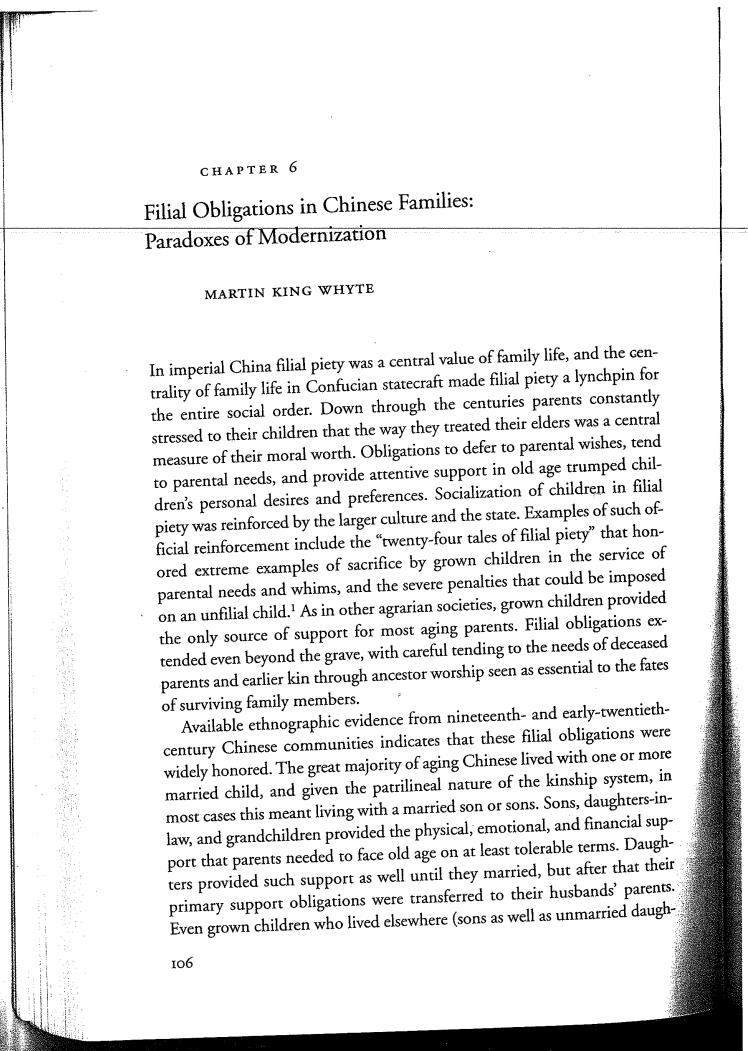
CHAPTER 6 Filial Obligations in Chinese Families: Paradoxes of Modernization MARTIN KING WHYTE In imperial China filial piety was a central value of family life,and the cen- trality of family life in Confucian statecraft made filial piety a lynchpin for the entire social order.Down through the centuries parents constantly stressed to their children that the way they treated their elders was a central measure of their moral worth.Obligations to defer to parental wishes,tend to parental needs,and provide attentive support in old age trumped chil- dren's personal desires and preferences.Socialization of children in filial piety was reinforced by the larger culture and the state.Examples of such of- ficial reinforcement include the“twenty-four tales of filial piety"that hon- ored extreme examples of sacrifice by grown children in the service of parental needs and whims,and the severe penalties that could be imposed on an unfilial child.As in other agrarian societies,grown children provided the only source of support for most aging parents.Filial obligations ex- tended even beyond the grave,with careful tending to the needs of deceased parents and earlier kin through ancestor worship seen as essential to the fates of surviving family members. Available ethnographic evidence from nineteenth-and early-twentieth- century Chinese communities indicates that these filial obligations were widely honored.The great majority of aging Chinese lived with one or more married child,and given the patrilineal nature of the kinship system,in most cases this meant living with a married son or sons.Sons,daughters-in- law,and grandchildren provided the physical,emotional,and financial sup- port that parents needed to face old age on at least tolerable terms.Daugh- ters provided such support as well until they married,but after that their primary support obligations were transferred to their husbands'parents. Even grown children who lived elsewhere (sons as well as unmarried daugh- I06
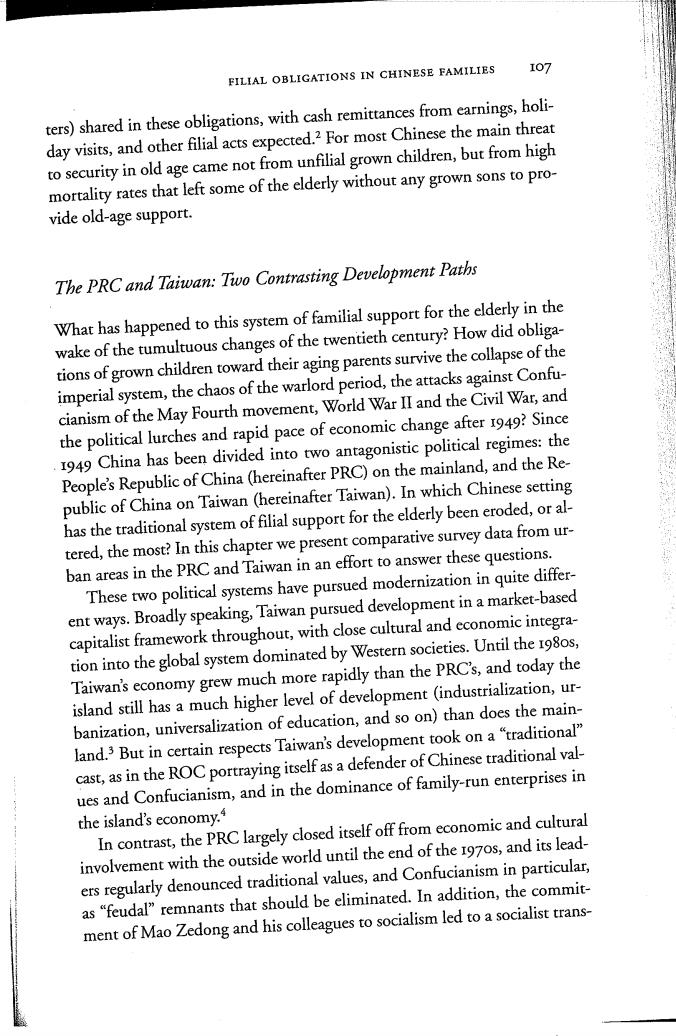
FILIAL OBLIGATIONS IN CHINESE FAMILIES I07 ters)shared in these obligations,with cash remittances from earnings,holi- day visits,and other filial acts expected.For most Chinese the main threat to security in old age came not from unfilial grown children,but from high mortality rates that left some of the elderly without any grown sons to pro- vide old-age support. The PRC and Taiwan:Two Contrasting Development Paths What has happened to this system of familial support for the elderly in the wake of the tumultuous changes of the twentieth century?How did obliga- tions of grown children toward their aging parents survive the collapse of the imperial system,the chaos of the warlord period,the attacks against Confu- cianism of the May Fourth movement,World War II and the Civil War,and the political lurches and rapid pace of economic change after 1949?Since 1949 China has been divided into two antagonistic political regimes:the People's Republic of China(hereinafter PRC)on the mainland,and the Re- public of China on Taiwan (hereinafter Taiwan).In which Chinese setting has the traditional system of filial support for the elderly been eroded,or al- tered,the most?In this chapter we present comparative survey data from ur- ban areas in the PRC and Taiwan in an effort to answer these questions. These two political systems have pursued modernization in quite differ- ent ways.Broadly speaking,Taiwan pursued development in a market-based capitalist framework throughout,with close cultural and economic integra- tion into the global system dominated by Western societies.Until the 198os, Taiwan's economy grew much more rapidly than the PRC's,and today the island still has a much higher level of development(industrialization,ur- banization,universalization of education,and so on)than does the main- land.3 But in certain respects Taiwan's development took on atraditional" cast,as in the ROC portraying itself as a defender of Chinese traditional val- ues and Confucianism,and in the dominance of family-run enterprises in the island's economy. In contrast,the PRC largely closed itself off from economic and cultural involvement with the outside world until the end of the 197os,and its lead- ers regularly denounced traditional values,and Confucianism in particular, as"feudal"remnants that should be eliminated.In addition,the commit- ment of Mao Zedong and his colleagues to socialism led to a socialist trans-
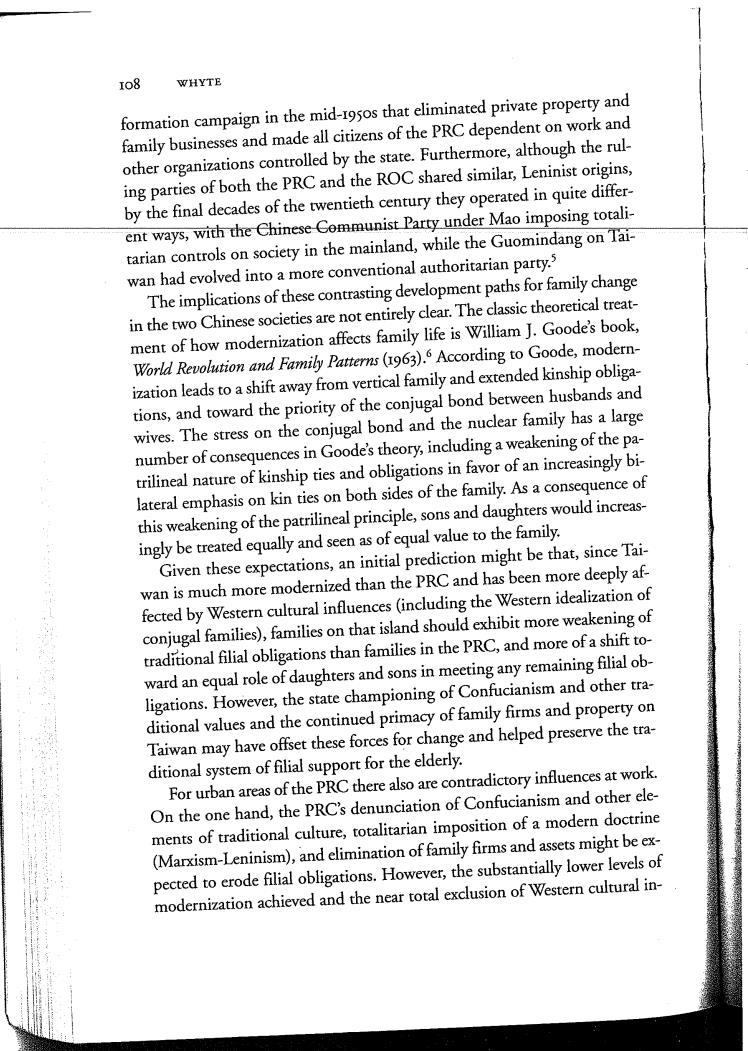
1o8 WHYTE formation campaign in the mid-I9sos that eliminated private property and family businesses and made all citizens of the PRC dependent on work and other organizations controlled by the state.Furthermore,although the rul- ing parties of both the PRC and the ROC shared similar,Leninist origins, by the final decades of the twentieth century they operated in quite differ- ent ways,with the Chinese Cemmunist Party under Mao imposing totali- tarian controls on society in the mainland,while the Guomindang on Tai- wan had evolved into a more conventional authoritarian party.s The implications of these contrasting development paths for family change in the two Chinese societies are not entirely clear.The classic theoretical treat- ment of how modernization affects family life is William J.Goode's book, World Revolution and Family Patterns(1963).According to Goode,modern- ization leads to a shift away from vertical family and extended kinship obliga- tions,and toward the priority of the conjugal bond between husbands and wives.The stress on the conjugal bond and the nuclear family has a large number of consequences in Goode's theory,including a weakening of the pa- trilineal nature of kinship ties and obligations in favor of an increasingly bi- lateral emphasis on kin ties on both sides of the family.As a consequence of this weakening of the patrilineal principle,sons and daughters would increas- ingly be treated equally and seen as of equal value to the family. Given these expectations,an initial prediction might be that,since Tai- wan is much more modernized than the PRC and has been more deeply af- fected by Western cultural influences(including the Western idealization of conjugal families),families on that island should exhibit more weakening of traditional filial obligations than families in the PRC,and more of a shift to- ward an equal role of daughters and sons in meeting any remaining filial ob- ligations.However,the state championing of Confucianism and other tra- ditional values and the continued primacy of family firms and property on Taiwan may have offset these forces for change and helped preserve the tra- ditional system of filial support for the elderly. For urban areas of the PRC there also are contradictory influences at work. On the one hand,the PRC's denunciation of Confucianism and other ele- ments of traditional culture,totalitarian imposition of a modern doctrine (Marxism-Leninism),and elimination of family firms and assets might be ex- pected to erode filial obligations.However,the substantially lower levels of modernization achieved and the near total exclusion of Western cultural in-
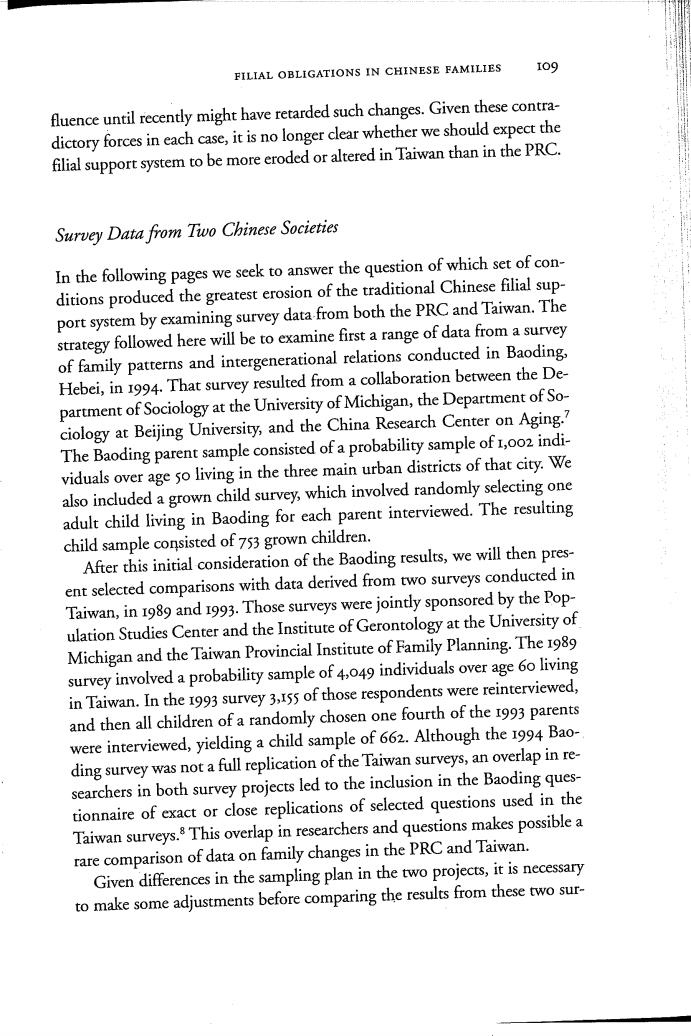
FILIAL OBLIGATIONS IN CHINESE FAMILIES 109 fluence until recently might have retarded such changes.Given these contra- dictory forces in each case,it is no longer clear whether we should expect the filial support system to be more eroded or altered in Taiwan than in the PRC. Survey Data from Two Chinese Societies In the following pages we seek to answer the question of which set of con- ditions produced the greatest erosion of the traditional Chinese filial sup- port system by examining survey data from both the PRC and Taiwan.The strategy followed here will be to examine first a range of data from a survey of family patterns and intergenerational relations conducted in Baoding, Hebei,in 1994.That survey resulted from a collaboration between the De- partment of Sociology at the University of Michigan,the Department of So- ciology at Beijing University,and the China Research Center on Aging.? The Baoding parent sample consisted of a probability sample of ,oo2 indi- viduals over age so living in the three main urban districts of that city.We also included a grown child survey,which involved randomly selecting one adult child living in Baoding for each parent interviewed.The resulting child sample consisted of 753 grown children. After this initial consideration of the Baoding results,we will then pres- ent selected comparisons with data derived from two surveys conducted in Taiwan,in 1989 and 1993.Those surveys were jointly sponsored by the Pop- ulation Studies Center and the Institute of Gerontology at the University of Michigan and the Taiwan Provincial Institute of Family Planning.The 1989 survey involved a probability sample of 4049 individuals over age 6o living in Taiwan.In the 1993 survey 3,I5s of those respondents were reinterviewed, and then all children of a randomly chosen one fourth of the 1993 parents were interviewed,yielding a child sample of 662.Although the 1994 Bao- ding survey was not a full replication of the Taiwan surveys,an overlap in re- searchers in both survey projects led to the inclusion in the Baoding ques- tionnaire of exact or close replications of selected questions used in the Taiwan surveys.This overlap in researchers and questions makes possible a rare comparison of data on family changes in the PRC and Taiwan. Given differences in the sampling plan in the two projects,it is necessary to make some adjustments before comparing the results from these two sur-
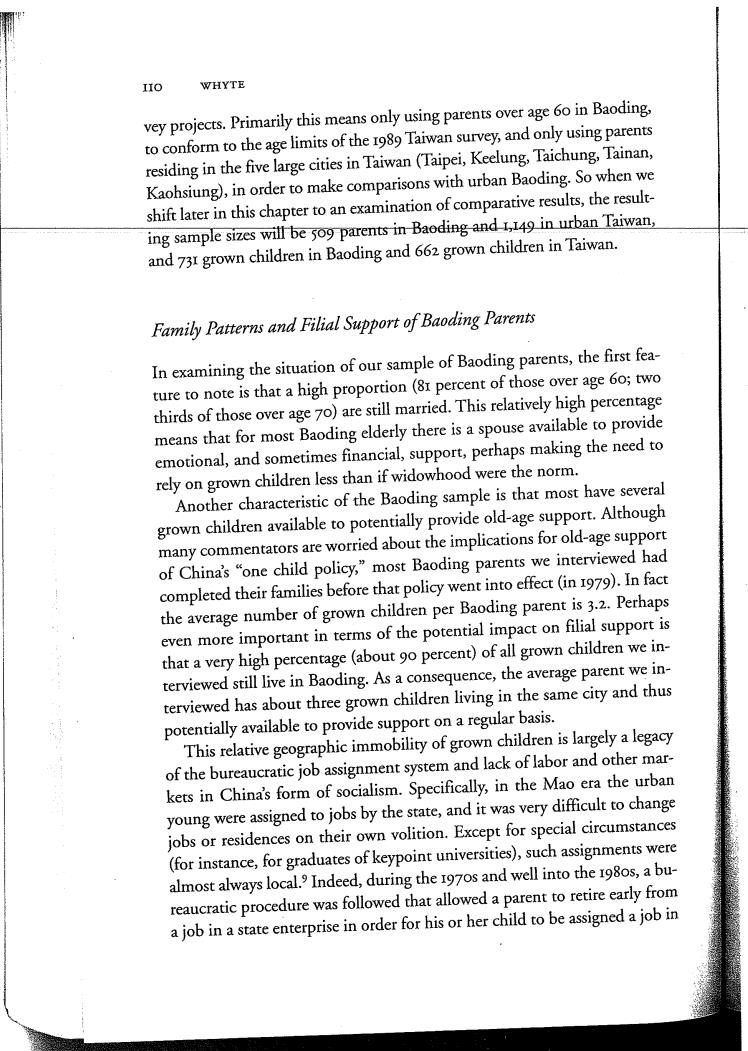
IIO WHYTE vey projects.Primarily this means only using parents over age 6o in Baoding, to conform to the age limits of the 8 Taiwan survey,and only using parents residing in the five large cities in Taiwan (Taipei,Keelung,Taichung,Tainan, Kaohsiung),in order to make comparisons with urban Baoding.So when we shift later in this chapter to an examination of comparative results,the result- ing sample sizes will be 5o9 parents in Baoding and 1,149 in urban Taiwan, and 73I grown children in Baoding and 662 grown children in Taiwan. Family Patterns and Filial Support of Baoding Parents In examining the situation of our sample of Baoding parents,the first fea- ture to note is that a high proportion (8I percent of those over age 6o;two thirds of those over age 7o)are still married.This relatively high percentage means that for most Baoding elderly there is a spouse available to provide emotional,and sometimes financial,support,perhaps making the need to rely on grown children less than if widowhood were the norm. Another characteristic of the Baoding sample is that most have several grown children available to potentially provide old-age support.Although many commentators are worried about the implications for old-age support of China's"one child policy,"most Baoding parents we interviewed had completed their families before that policy went into effect(in 1979).In fact the average number of grown children per Baoding parent is 3.2.Perhaps even more important in terms of the potential impact on filial support is that a very high percentage(about 9o percent)of all grown children we in- terviewed still live in Baoding.As a consequence,the average parent we in- terviewed has about three grown children living in the same city and thus potentially available to provide support on a regular basis. This relative geographic immobility of grown children is largely a legacy of the bureaucratic job assignment system and lack of labor and other mar- kets in China's form of socialism.Specifically,in the Mao era the urban young were assigned to jobs by the state,and it was very difficult to change jobs or residences on their own volition.Except for special circumstances (for instance,for graduates of keypoint universities),such assignments were almost always local.Indeed,during the os and well into the 1os,a bu- reaucratic procedure was followed that allowed a parent to retire early from a job in a state enterprise in order for his or her child to be assigned a job in

FILIAL OBLIGATIONS IN CHINESE FAMILIES III that same enterprise.Under this procedure(termed the dingrisystem),adult children ended up not simply living in the same city,but working and usu- ally living in the same work-unit complex with their parents.In sum,de- spite the anti-Confucian rhetoric of the Chinese Communist Party during the Mao era,the workings of Chinese socialism and the absence of a labor market actually kept most grown children tied closely to their aging parents. The economic reforms launched in China after 1978 had not altered this im- mobility very much as of the time of our Baoding survey in 1994. When it comes to the household arrangements of Baoding parents,how- ever,things look decidedly less traditional.It is true that about 64 percent of Baoding parents live with one or more grown child.However,a substantial proportion of this coresidence involves relatively young parents living with an unmarried child or children.(The reader should keep in mind that our Bao- ding parent sample included individuals as young as so.)Only about 3s per- cent of Baoding parents were living in extended families with one or more marriedchild.Even of those over age 60,less than 40 percent live in such ex- tended families.The predominant family form of the Baoding elderly is thus nuclear-residence either only with a spouse,or with a spouse and one or more unmarried children.In other words,it is not obligatory,and further- more it is not even the most common situation,for an older Baoding parent to reside in an extended family with a married child.While we will examine the comparison with Taiwan later,it appears that the Baoding situation in 1994 represents a substantial decrease in extended family living for the elderly compared to the past(and to the situation in contemporary rural China). When they do live in an extended family unit,it is almost always a stem family structure with only one married child,rather than the traditionally favored joint family involving two or more married children and their fam- ilies.In such stem families in Baoding it is still much more common to live with a married son,rather than with a married daughter.Specifically,it is about three times as common to live with a married son as with a married daughter.The departure from traditional arrangements revealed in our Baoding data involves the propensity of elderly Baoding residents to live separately from all of their married children in a nuclear family,rather than any tendency to coreside with a married daughter instead of a son. It should be emphasized once again that Baoding parents do not end up in nuclear family structures because there are no grown children available to live with.As noted earlier,most have several children available,and for the

I12 WHYTE older parents in our sample,most of those grown children are married.But coresidence with a married child does not seem to be necessary,and it may not even be preferred.(See Chapters I and 4for discussion of the preferences of rural elderly for living arrangements.)While an interpretation of this pat- tern must await the presentation of data on other aspects of intergenera- tional relations,the figures just presented seem to point to an increasing ac- ceptance of a new pattern some have termed"networked families"(wanglo jiating),with parents living near several grown children who cooperate in providing support and assistance,but without the need to coreside with any one such child in order to find old-age security. Financial security is a concern of the aged in any society,and in agrarian societies that security comes from having grown children to support you.In China in the past it was said that one had sons to guard against old age,and that the more sons one had,the more prosperous one would become(and presumably remain as one became elderly).What is the situation in con- temporary Baoding?The first point to stress is that most of the Baoding parents we interviewed had earnings of their own and did not have to face total dependency on their children.Overall,about 85 percent had some earnings,with 25 percent having wage income only,sI percent having pen- sion income only,and 9 percent enjoying both pensions and wages.Men are favored over women in this realm,both in terms of continuing to work and receive wages until a more advanced age,and also by being more likely to have met the qualifications for pensions from their work units.2 However, given the low figures on widowhood presented earlier,most parents who do not have any income of their own (primarily mothers)often have a spouse who does.In other words,for the great majority of Baoding parents,there is no need to rely totally on support from grown children to obtain financial security.For most Baoding elderly,financial contributions from children are supplementary,rather than primary and essential. To what extent do grown children provide financial support to their par- ents,even if such support is not essential?We inquired about such financial support in two forms-both cash assistance and the provision of food,cloth- ing,and other material goods.Overall,only about one fourth of Baoding parents were receiving cash assistance from their children,while a little over one third were receiving material goods,with the proportions increasing with the age of the parent.We had expected that at least token cash or other
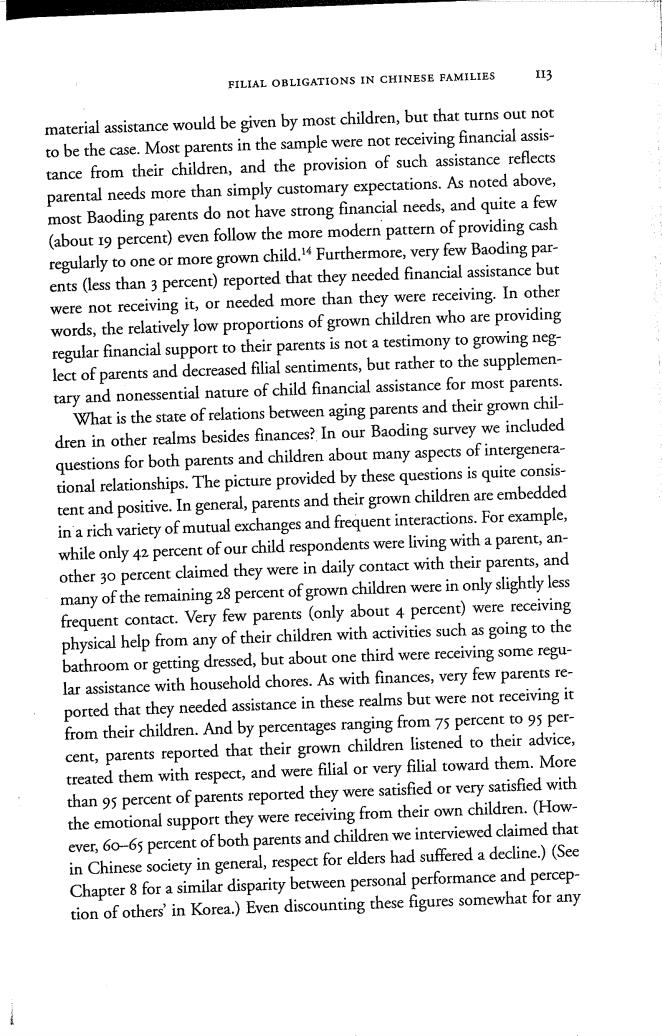
FILIAL OBLIGATIONS IN CHINESE FAMILIES I3 material assistance would be given by most children,but that turns out not to be the case.Most parents in the sample were not receiving financial assis- tance from their children,and the provision of such assistance reflects parental needs more than simply customary expectations.As noted above, most Baoding parents do not have strong financial needs,and quite a few (about 19 percent)even follow the more modern pattern of providing cash regularly to one or more grown child.Furthermore,very few Baoding par- ents(less than 3 percent)reported that they needed financial assistance but were not receiving it,or needed more than they were receiving.In other words,the relatively low proportions of grown children who are providing regular financial support to their parents is not a testimony to growing neg- lect of parents and decreased filial sentiments,but rather to the supplemen- tary and nonessential nature of child financial assistance for most parents. What is the state of relations between aging parents and their grown chil- dren in other realms besides finances?In our Baoding survey we included questions for both parents and children about many aspects of intergenera- tional relationships.The picture provided by these questions is quite consis- tent and positive.In general,parents and their grown children are embedded in a rich variety of mutual exchanges and frequent interactions.For example, while only 42 percent of our child respondents were living with a parent,an- other 3o percent claimed they were in daily contact with their parents,and many of the remaining 28 percent of grown children were in only slightly less frequent contact.Very few parents (only about 4 percent)were receiving physical help from any of their children with activities such as going to the bathroom or getting dressed,but about one third were receiving some regu- lar assistance with household chores.As with finances,very few parents re- ported that they needed assistance in these realms but were not receiving it from their children.And by percentages ranging from 75 percent to 95 per- cent,parents reported that their grown children listened to their advice, treated them with respect,and were filial or very filial toward them.More than 9s percent of parents reported they were satisfied or very satisfied with the emotional support they were receiving from their own children.(How- ever,60-65 percent of both parents and children we interviewed claimed that in Chinese society in general,respect for elders had suffered a decline.)(See Chapter8for a similar disparity between personal performance and percep- tion of others'in Korea.)Even discounting these figures somewhat for any

I14 WHYTE tendency of respondents to put the best public face on family relationships for our interviewers,there are no signs in our data of any serious erosion of filial obligations and how the elderly are treated. Even if the net flow of intergenerational exchanges is upward,from adult children to parents,this is by no means a relationship only of benefit to the elderly.Parents have in the past provided assistance in multiple ways to their growing and adult children-in such realms as helping them get into good schools or acquire a favorable job,financing their weddings,and providing housing in a scarce market.For many grown children the assistance from parents continues in multiple ways as well-through providing childcare as- sistance in particular,but also (as noted earlier)in some cases by providing financial assistance,help with shopping and household chores,and through advice and the mobilization of personal contacts (from the parents'gunxi network)to help solve particular life problems.In a social order that until recently was not designed to stress services and convenience for consumers, and in which full-time jobs for both husbands and wives are the rule among young couples,it has been very difficult to cope with the demands of daily life without the extra assistance that parents and other kin can provide. We had expected,nonetheless,to find signs of generational conflict in the attitudes and values of the parents and grown children that we interviewed. The popular literature on Chinese social trends stresses that the rapidity of social and cultural change as well as China's tumultuous political shifts have produced marked contrasts between the life experiences and views of young people today and earlier generations.Indeed,when we examined a range of social and political attitudes of Baoding parents and their grown children, we found consistent differences.In general,the parents expressed more sup- port for both traditional socialist and age-old Chinese values than did their grown children,who voiced somewhat more support for individualistic views.5 In tastes for music,films,television shows,and reading matter,there are also clear signs of a generation gap,with parents again more likely to fa- vor traditional forms(for example,traditional Chinese opera)and socialist genres(for example,films about revolutionary battles)than their children, who tend to favor music,films,and other cultural products with a contem- porary popular or international flavor. However,when it comes to attitudes about family obligations and filial support,there is no sign of any such generational conflict in our Baoding data.Indeed,where there are differences,it is generally the case that grown
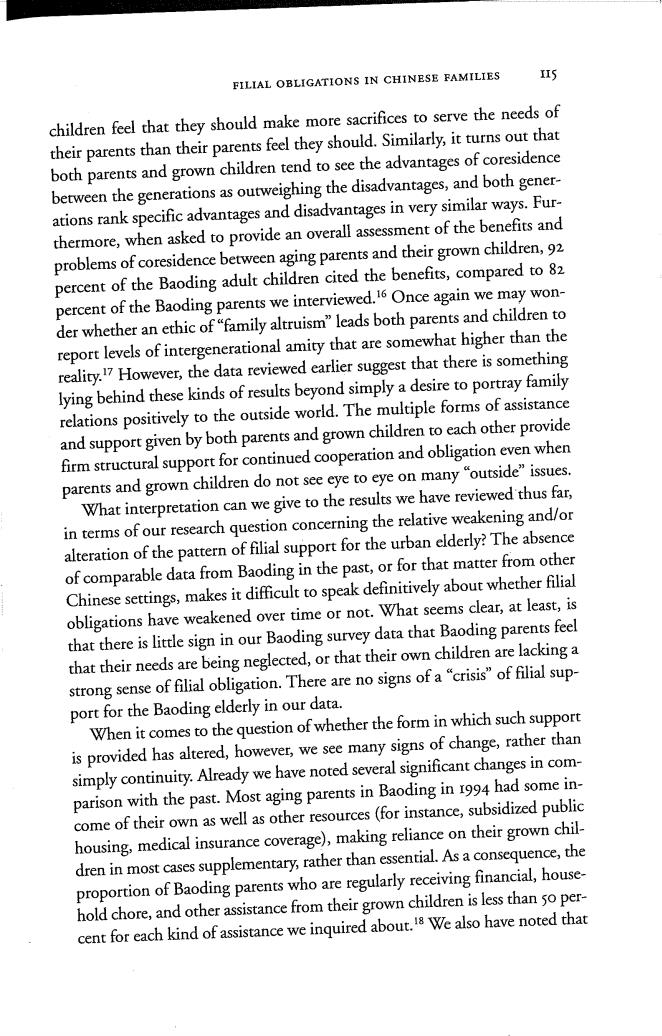
FILIAL OBLIGATIONS IN CHINESE FAMILIES IIS children feel that they should make more sacrifices to serve the needs of their parents than their parents feel they should.Similarly,it turns out that both parents and grown children tend to see the advantages of coresidence between the generations as outweighing the disadvantages,and both gener- ations rank specific advantages and disadvantages in very similar ways.Fur- thermore,when asked to provide an overall assessment of the benefits and problems of coresidence between aging parents and their grown children,92 percent of the Baoding adult children cited the benefits,compared to 82 percent of the Baoding parents we interviewed.Once again we may won- der whether an ethic of "family altruism"leads both parents and children to report levels of intergenerational amity that are somewhat higher than the reality.7 However,the data reviewed earlier suggest that there is something lying behind these kinds of results beyond simply a desire to portray family relations positively to the outside world.The multiple forms of assistance and support given by both parents and grown children to each other provide firm structural support for continued cooperation and obligation even when parents and grown children do not see eye to eye on many"outside"issues. What interpretation can we give to the results we have reviewed thus far, in terms of our research question concerning the relative weakening and/or alteration of the pattern of filial support for the urban elderly?The absence of comparable data from Baoding in the past,or for that matter from other Chinese settings,makes it difficult to speak definitively about whether filial obligations have weakened over time or not.What seems clear,at least,is that there is little sign in our Baoding survey data that Baoding parents feel that their needs are being neglected,or that their own children are lacking a strong sense of filial obligation.There are no signs of a"crisis"of filial sup- port for the Baoding elderly in our data. When it comes to the question of whether the form in which such support is provided has altered,however,we see many signs of change,rather than simply continuity.Already we have noted several significant changes in com- parison with the past.Most aging parents in Baoding in 1994 had some in- come of their own as well as other resources(for instance,subsidized public housing,medical insurance coverage),making reliance on their grown chil- dren in most cases supplementary,rather than essential.As a consequence,the proportion of Baoding parents who are regularly receiving financial,house- hold chore,and other assistance from their grown children is less than so per- cent for each kind of assistance we inquired about.We also have noted that